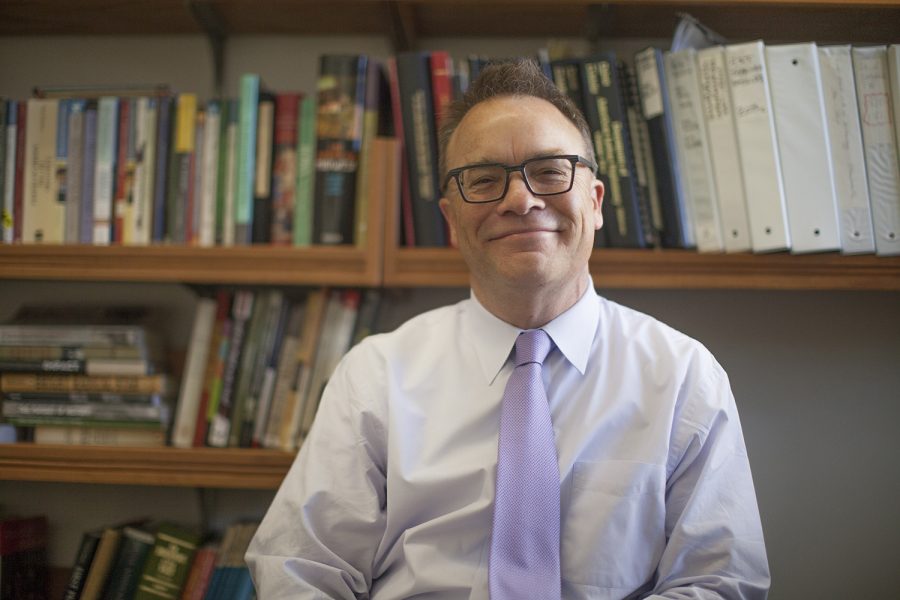Shawnee people reclaim their history with help of research done by UI professor
UI associate professor Stephen Warren has been conducting research on the Shawnee Tribe since his time as an undergraduate. Warren recently gifted an extensive compilation of archival materials to the Shawnee people in hopes that it will allow them to continue to tell their own history.
University of Iowa Professor Stephen Warren poses for a portrait in Schaeffer Hall on Tuesday, March 26, 2019. Warren teaches History and American Studies with a focus on the Shawnee Tribe.
March 28, 2019
When studying historical records, it is important to remember the context in which they were written — and who wrote them — may misrepresent groups and events. In the case of Native Americans, University of Iowa Associate Professor Stephen Warren recognized the misrepresentation in history of the Shawnees and wanted to change it.
“I think that one of the tragedies of being a colonized person is that the colonizer removes your history and takes it from you,” Warren said.
He has focused his studies on the Shawnees since he was an undergraduate. He decided to use ethnography to begin creating a more accurate account of their history, he said.
Recently, he gave an extensive amount of archival materials he compiled to the Shawnee people. His goal, he said, is to give the Shawnees their own voice in history, and he hopes the gift will help them understand a more accurate version of their history.
“A big issue for me is literally repatriating Native American materials to their rightful owners … so that you know they don’t have to travel all over the world, you know to piece together the story of their people,” he said.
The Shawnees were originally from Ohio, but the U.S. forcibly removed from the state between 1826 and 1832 as result of the Indian Removal Act, Warren said. Today, there are three federally recognized tribes in the Shawnee Nation that are in Oklahoma.
Shawnee Economic Development Director Greg Pitcher became involved with the Shawnees after working with the Cherokee tribe and the congressional delegation to gain federal recognition that Shawnees are different from Cherokees.
Pitcher said that, at 72 years old, he has learned a lot about the Shawnees from Warren’s scholarship. The scholarship is appreciated by all three federally recognized Shawnee tribes, because rather than writing their history from a distance, he spent “hours and hours, year after year” gaining the trust of elders from all three, Pitcher said.
“He gained the confidence of the elders of all three tribes in order to write what — most Shawnees would say — is the most complete telling of the tribes and who they are,” Pitcher said.
Ben Barnes, the second chief of the Shawnee tribe, is one particular highly ranking member Warren earned the respect from during his research, Pitcher said.
Barnes said Warren was different from other researchers because he didn’t treat the Shawnees as sources of data but as important perspectives in his scholarly work.
“Steve is an advocate for community engagement and … has always shown the sincere appreciation for the importance of the community and tribal nations involved when he works with them,” Barnes said.
RELATED: A celebration of Native and self-defining culture
Though he gained the trust of elders eventually, Warren said, when he began visiting the Shawnees in 2001, the tribe was “rightfully suspicious.”
“When you first visit a community that’s been so poorly treated by Americans … it’s not surprising that native people and members of other marginalized groups are sometimes reticent to share their stories,” he said.
He gained the confidence of the tribe by attending ceremonial events and being transparent in his research.
As of now, Warren said, he wants to take a step back from his study of the Shawnee tribe and act as a “cheerleader” on the sideline. With the gift of archival materials, he said, Shawnees are able to tell their history, which is something they want to do.
“I think it’s time for the Shawnees to tell their own stories … they just needed archival material to do it,” he said.






